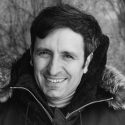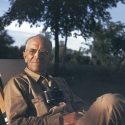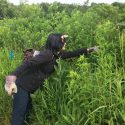Aldo Leopold series involves community in environmental discussions
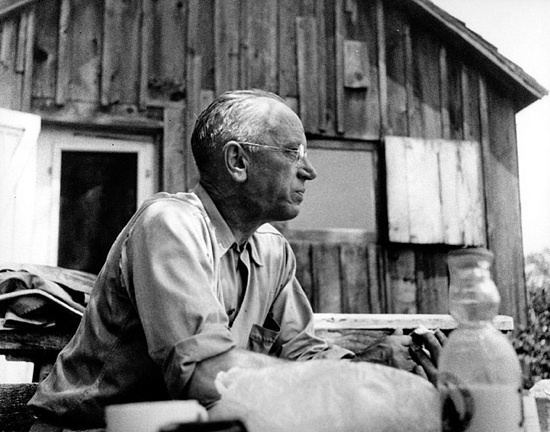
Aldo Leopold, a 20th-century conservationist and former UW–Madison faculty member, is shown at his Sauk County shack in about 1940. UW-Madison archives
As environmental concerns grow more urgent, the work of Aldo Leopold remains a vital touchstone. The University of Wisconsin–Madison professor was a pioneering conservationist and the author of A Sand County Almanac, the seminal 1949 book about people’s relationship to nature.
UW-Madison will honor Leopold’s legacy and connect it to our time with a wide-ranging series of seminars, lectures, and workshops.
Running from January to June, the series includes classes in visual art and writing inspired by Leopold’s thoughtful observation of nature, as well as humanities lectures that address his work and influence. The series will draw on a multitude of UW–Madison resources, with insightful perspectives from professors and staff, glimpses of rare historical books, and opportunities to experience the Arboretum, Lakeshore Path, and Allen Centennial Garden.
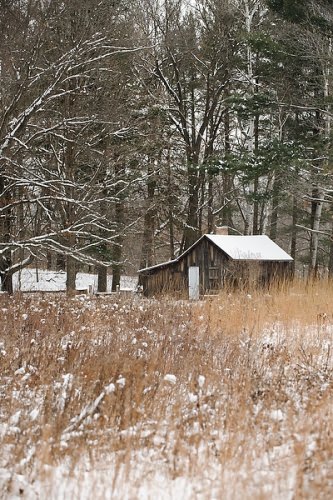
Snow-covered prairie and woods surround the historic Aldo Leopold shack in rural Baraboo, Wis. Now managed by the Aldo Leopold Foundation, the “shack” was a seasonal home and place of research for Leopold. Photo: Jeff Miller
Sponsored by the Division of Continuing Studies, these programs are open to the public and do not require admission as a traditional UW student.
“The Leopold series explores the contemporary relevance of one of Wisconsin’s greatest thinkers, capitalizing on the expertise of UW–Madison faculty and staff who are uniquely qualified to interpret his work,” says program director Jessica Courtier. “The accessible courses invite all community members to participate in the discussions and activities and to contemplate what it means to know nature.”
Here are some of the events:
- Aldo Leopold’s Legacy: The Land Ethic in Today’s World (April 6-27) updates Leopold’s central concept of moral responsibility to nature. It features enlightening lectures by Paul Robbins, director of the UW–Madison Nelson Institute for Environmental Studies; Bill Tishler, professor emeritus of landscape architecture; Monica White, professor of environmental justice; Michael Hansen, the land-care manager of the Arboretum; and Leopold biographer Curt Meine.
- Jens Jensen: A Pioneer in American Landscape Design and Conservation (March 1-15) surveys the work of one of Leopold’s conservation colleagues, an innovative landscape architect who brought inspiration from the natural world—especially native plants—to the realm of cultivated landscapes.
- Those interested in practicing Leopold-style observation through writing, listening, or making art can register for Writing Nature: Signatures in the Wild (Jan. 25-Feb. 15 and March 1-22); Discovering Patterns in Nature (Feb 24-April 28); Nature’s Music: Knowing the Natural World Through Sound (Feb. 23-March 16); Contemplative Walks with Nature (May 3-June 21); and Artful Observation: Nature Journaling at the Arboretum (May 12-June 2). These classes will allow participants to sink deeply into the natural world around them, using their senses to focus and contemplate.
- Walking Leopold’s Legacy (May 6) takes participants on a trip to the Aldo Leopold Foundation in Baraboo. This daylong event begins with a special tour of Leopold’s homestead—the famous shack and its environs—led by Leopold biographer Meine. After lunch the group will participate in a lively workshop and discussion related to the land ethic.
- Holding History: The Nature of the Book (April 4) invites participants to view and handle rare manuscripts. This edition will highlight the many kinds of natural materials that have been used to make books and share unusual examples of how books have captured new discoveries about the subject of nature.
- As part of the annual UW Writers’ Institute, celebrated Wisconsin nature writer Blair Braverman presents a reading open to the public on March 25. Braverman is the author of Welcome to the Goddamn Ice Cube: Chasing Fear and Finding Home in the Great White North, which explores her travels in arctic Norway and Alaska.
“Participants in the Aldo Leopold series will come away with a new understanding of nature and their own place in it,” Courtier says.
For more details, including times, locations, and registration fees, see go.wisc.edu/aldoleopold.

